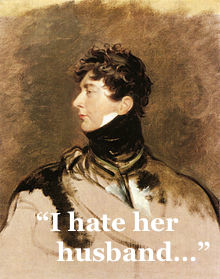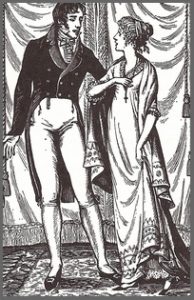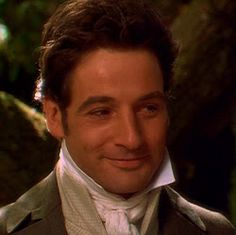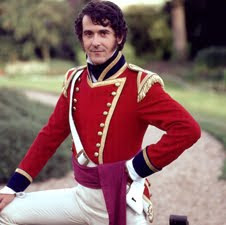Happy post-Jubilee, readers! I hope you were able to experience the pageantry in one form or another this past weekend. Whether it was watching clips on the news, or as our own Joana Starnes, camping out to see the Windsors parade by, this American hopes all your royal dreams came true!
With the onset of Her Majesty’s Platinum Jubilee, I began to wonder about our dear Jane’s affection and
love for the monarchy during her lifetime. Even though she dedicated Emma to the Prince Regent, her dislike for him is universally acknowledged in favor of his wife Princess Caroline of Brunswick. As she said in a letter to a friend, in 1813, “I suppose all the world is sitting in judgement of the Princess of Wales’ letter…Poor woman, I shall support her as long as I can because she is a woman, and because I hate her husband.”
But, according to the Office of Research and Education from Sydney, Australia, Jane’s love of the monarchy did not just remain within the confines of her personal writing, but also entered that of her novels. It was believed that many of her characters and scenarios mimicked the world around her, or like all writers what she wished to have happen, actually did!

Mansfield Park illustration by Joan Hassall
In Mansfield Park, Tom Bertram ineptly takes over the estate when his father sent him home from the West Indies. His drinking and gambling have put his brother Edmund’s inheritance in jeopardy, but Tom is unrepentant. His selfishness almost ruins the family. The parallel between Tom and the Prince Regent are almost uncanny: the heir to the throne; inconsiderate of those who his duty is to protect and ‘nurture.’ When Sir Thomas Bertram dies, it will be Tom’s responsibility to provide for and care for his family, just as when King George III dies, the Prince Regent will be responsible to protect and nurture the nation.
It is believed that Jane, as most of the country at that time, had an affinity for ‘Farmer George’ or King George the III. There is speculation that she named Mr. Knightley in Emma ‘George’ because, like his alleged namesake, he is benevolent and considerate of the people he is tasked from birth to protect–In the case of Emma, the people of Highbury. However, couldn’t one also argue the opposite for Mr. George Wickham in Pride and Prejudice? Why is he named George? There are actually two Georges and a Georgianna!
‘Farmer George’ or King George the III. There is speculation that she named Mr. Knightley in Emma ‘George’ because, like his alleged namesake, he is benevolent and considerate of the people he is tasked from birth to protect–In the case of Emma, the people of Highbury. However, couldn’t one also argue the opposite for Mr. George Wickham in Pride and Prejudice? Why is he named George? There are actually two Georges and a Georgianna!
Similar to King George the III and the Prince Regent, you have a dichotomy. How could a father such as King George, a caring King who historians have proven loved and adored his wife and despised the evils of gambling and debauchery, have a son who was the complete opposite? Wait for it….How can a Godfather such as George Darcy give his Godson every opportunity to be successful and excel in life no matter the struggles placed by his circumstances at birth, have the child grow up to be the complete opposite?

That CLEVER Jane! She made art imitate life! If only the Prince Regent had repented as Tom Bertram, or received his due as George Wickham. But alas, one cannot change the destiny of man except on the pages of a novel.
What are your thoughts on the parallel of the Monarchy and Jane’s Writing? Had you noticed them before?

16 comments
Skip to comment form
fascinating
Author
Thank you, Denise!
I hadn’t considered this at all but what a great thought. Comparing it with the novels and her known dislike of the Regent it certainly seems plausible.
Author
Thank you, Teresa. Writers are often inspired by their surroundings, but some of us delve into the subtleties so much better than others. That Jane was the best!
I have never noticed that. However, yesterday, I was telling my husband and teenage sons how everything- in the case Star Wars- can go back to Jane Austen. If you try hard enough, it truly can. 🙂
Author
Rebecca, you are speaking my language! My sons always try to relate everything back to the Star Wars, and it seems to work. 🙂
Wow, what an intriguing parallel, Anngela! I’ve never considered that connection before. Very fun to think about.
Author
Thank you, Katie!
I’ve often thought of the parallels between Elizabeth Bowes Lyon (future Queen Mother) and Prince Albert (future King George VI) and Elizabeth Bennet and Darcy. EBL reportedly refused the proposal of the Prince several times in the early 1920s due to their different status, but the very last time, with support from Queen Mary, she accepted him.
Author
Zoe, I hadn’t made that connection, but there are certainly some parallels!
Wow! Super interesting post. Gave me lots of things to think about—the parallels of Jane’s novels and history of the times. Thanks Angela.
Author
So glad you enjoyed it, Mary!
I can’t but wonder how the spirit of George IV liked the strains of “Sweet Caroline” being belted out at the Platinum Jubilee concert, especially by his young several times great nephew and namesake Prince George.
Author
Kathleen, What a fun thought! I too often wonder how my own ancestors would have reacted to my actions and choices!
Would Mr. Hurst be an example of eating and drinking to excess? Or is he just a benign portly character who ignores his wife and over-endulges? This was really interesting. Thanks for sharing this post.
Author
J.W. That is a great observation!